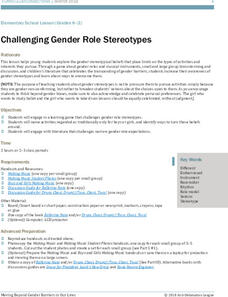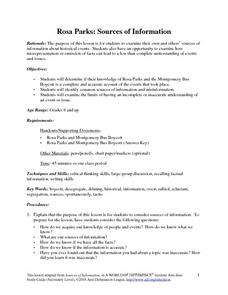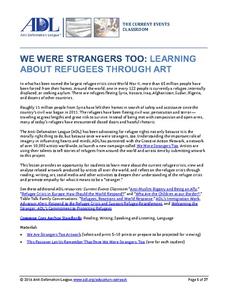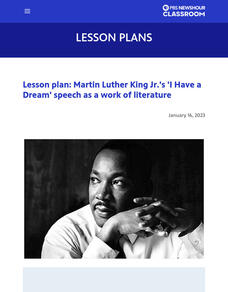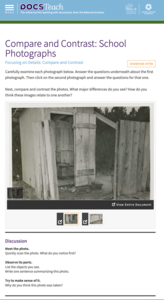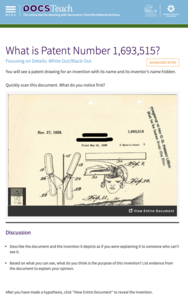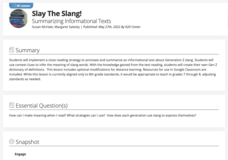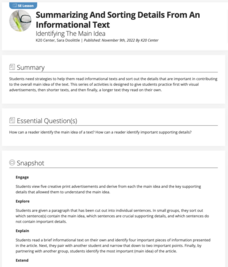Anti-Defamation League
Identity, Hair and Seeing Myself
Scholars read about and discuss how seven-year-old Morgan Bugg wrote a company to add avatar styles that reflect her. The company realized its error and added more inclusive styles to its avatars. Learners reflect on identity, what...
Anti-Defamation League
Lonnie Chavis of 'This Is Us' Writes about Racism
Scholars read and discuss an essay by 12-year-old actor Lonnie Chaves about racism, paying close attention to how racism presents itself in interpersonal and institutional ways. Learners reflect on how they experience or witness racism...
Anti-Defamation League
Sneakers and Prejudice: Letters to Challenge Bias
After learning that NBA player Stephen Curry's shoes only come in boys' sizes, Riley wrote a letter sharing her concern, highlighting the gender bias and inviting Curry to take action. Scholars view a news clip, review the letters,...
Anti-Defamation League
Job Roles without Gender Boundaries
A lesson examines gender stereotypes and how they relate to career choices. Small groups look closely at job titles, identify gender bias, and brainstorm ways to add inclusivity. Individuals reflect on their interests and future career...
Anti-Defamation League
Challenging Gender Role Stereotypes
Through thoughtful discussion and a read-aloud, scholars challenge gender role stereotypes. Pupils examine pictures and collaborate with their small groups to debunk stereotypes. They explain what gender role stereotypes they know of and...
Anti-Defamation League
Rosa Parks: Sources of Information
Young scholars show what they know about Rosa Parks and the incident on one of the buses in Montgomery, Alabama. Groups discuss and identify where they receive most of their information. They examine the importance of having a complete...
Anti-Defamation League
We Were Strangers Too: Learning About Refugees Through Art
Did you know that "in the largest refugee crisis since World War II, more the 64 million people have been forced from their homes"? The Anti-Defamation League presents an activity that asks class members to examine a series of artworks...
Anti-Defamation League
Social Justice Poetry
Learners gain insight into how songs and poems express feelings of injustice. They also learn about literary devices and types of poems and make a personal connection when they write their own free verse poems about injustice.
Anti-Defamation League
7 Ideas for Teaching Women's History Month
Celebrate Women's History Month with hands on-learning. The resource provides seven strategies to help educators teach Women's History Month, ranging from watching films to reading books written by women. Activities including writing...
National Endowment for the Humanities
Women's Suffrage: Why the West First?
Eleventh graders discuss the granting of voting rights to women in several Western states. They take a stand, supported by historical evidence, as to whether or not a single theory explains why Western states were the first to grant full...
University of Minnesota
Manduca sexta: Caterpillar Dissection
Caterpillars have an amazing, yet tough job to perform in their short lives — eat much, avoid predators, and try not to let all those comments about being the unattractive stage of the life cycle get to them. How do they handle it all?...
University of Minnesota
Welcome To Your Senses
Sound, sight, taste, touch, and smell—oh the world of senses! What do these five senses have to do with the brain? The answer: everything. Explore how the brain sends and receives messages by having the class participate in several sense...
PBS
Amid Rising Economic Inequality, Does America Need a Third Reconstruction?
Young political scientists investigate the Poor People's Campaign protest held in Washington, D.C., on June 18, 2022. They research how the event was reported in various news outlets and consider their stance on whether "poverty is...
PBS
Explore Art and Movement Inspired by Jacob Lawrence’s Migration Series
Panel 58 from Jacob Lawrence's "Migration Series" of paintings provides middle schoolers with an opportunity to sharpen their observation and analytical skills. After engaging in a warm-up activity that introduces the concepts of...
PBS
Write a New Year Poem Inspired by Amanda Gorman’s "New Day’s Lyric"
Here's a new take on a new year. After watching and discussing the video of Youth Poet Laureate Amanda Gorman performing her "New Day's Lyric," young poets craft poems that reflect their feelings about the past year and their resolutions...
PBS
History of Juneteenth and Why It’s Now a National Holiday
June 19 is now a United States federal holiday. Young historians examine the background of the first Juneteenth celebrations and why on June 15, 2021, Congress finally approved "Juneteenth National Independence Day" as a federal holiday.
PBS
Dr. Martin Luther King Jr.’s ‘I Have a Dream’ Speech as a Work of Literature
To appreciate the oratory of Dr. Martin Luther King Jr.'s "I Have a Dream" speech, scholars examine the rhetorical devices and influences that make the speech so famous. They examine background information, conduct a close reading of the...
PBS
Dr. Martin Luther King Jr.’s ‘I Have a Dream’ Speech as Visual Text
Young historians watch a video of Dr. Martin Luther King Jr. delivering his "I Have a Dream" speech and answer questions that test their knowledge of the event. After discussing the fact sheet, they reread the speech, select a phrase or...
DocsTeach
Compare and Contrast: School Photographs
Separate and very unequal! An interactive presents learners with two images: a photograph of a boys' bathroom at a school in Gloucester County, Virginia, and a second of a girls' bathroom at a different school in the same county. The...
DocsTeach
African American Soldiers and Civil Rights During WWI
Young scholars analyze primary source documents and images to determine how African American soldiers were denied their civil rights during World War I.
K20 LEARN
Rikki-Tikki-Types of Sentences: Indicative, Imperative, Interrogative Mood
Rudyard Kipling's "Rikki-Tikki-Tavi" and a song from the musical "Hamilton" allow middle schoolers to practice using punctuation to indicate whether sentences are indicative, imperative, or interrogative.
DocsTeach
What is Patent Number 1,693,515?
Scholars examine a document from 1928 featuring a mystery invention. Following their observations and discussion, the document reveals the invention of the permanent wave machine by Marjorie S. Joyner. Class members read about Joyner,...
K20 LEARN
Slay the Slang! Summarizing Informational Texts
Middle schoolers get hip to the jive with a lesson about slang. They closely examine examples of slang and use context clues to infer the meaning of the terms. Groups read and summarize an article about a teacher who created a Gen Z...
K20 LEARN
Summarizing and Sorting Details from an Informational Text: Identifying the Main Idea
Scholars participate in two activities that teach them to identify the main idea and key supporting details in informational text. Partners create a visual that reflects the main idea and key supporting details in an informational text...






